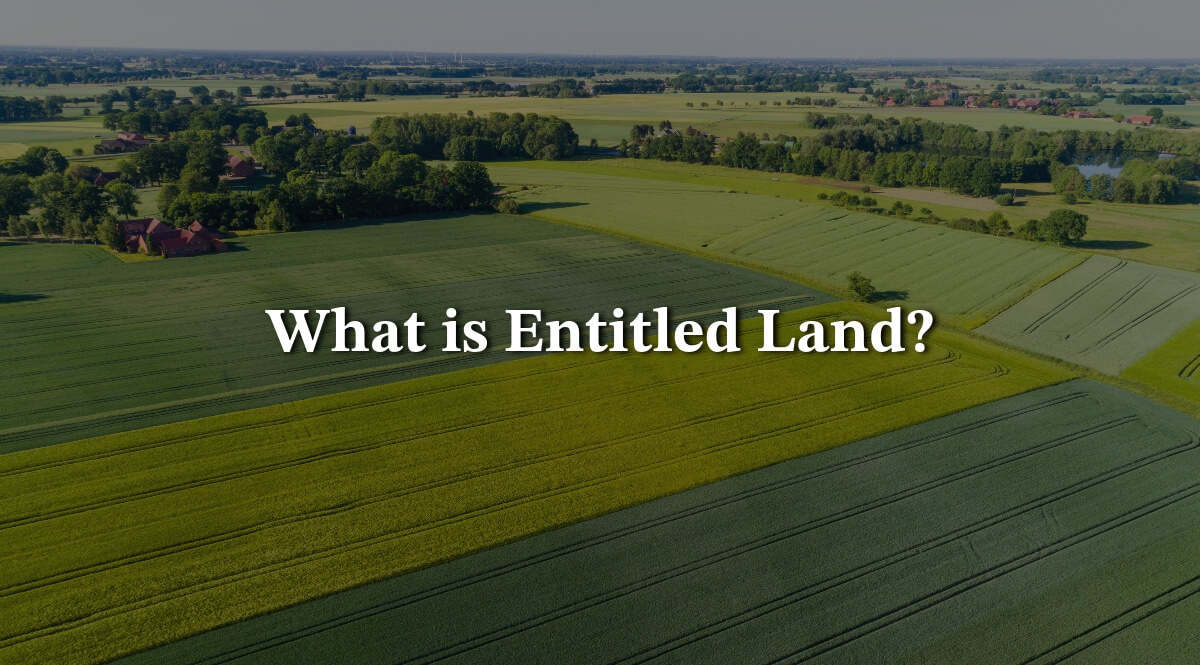
What is Entitled Land? The Process of Land Entitlement
If you are in a situation to buy land and want to build a property, maybe you wonder what entitled land means. Land entitlement is the legal process of obtaining utility approvals for the right to develop property for a desired use. This process involves working with local governmental bodies (like planning and zoning boards) and can include seeking rezoning, obtaining variance, securing permits for subdivision, road approvals, and so on. Land entitlement aims to increase the value of a piece of property, either for resale purposes or for development projects.
Entitled land – the process of obtaining land entitlement
Here’s a basic breakdown of what the process might involve:
Research & Due Diligence
Before buying a piece of property for development, it’s critical to understand the local zoning laws, any covenants or restrictions on the property, and what potential changes might be feasible.
Pre-Application Process
This may involve meetings with local planners to discuss the proposed development and understand its feasibility before formally applying for entitlements. This can include submitting site plans, environmental studies, traffic impact analyses, and other required documents to the local planning department.
Rezoning process

Zoning regulations are legislations that lay down specific guidelines for using real estate in various areas.
Because zoning determines the permitted land activities on individual pieces of land, it can impede the desired usage of property owners.
The activities encompass recreational, transportation, agricultural, residential, and commercial purposes.
If the land you own is not designated for your intended use, you may request a change to a different zone.
Therefore, if you have acquired land in a residential locality and wish to utilize it for commercial ventures, you will need to approach your local government and apply for rezoning.
Zoning variances
Sometimes landowners don’t need to modify the allowable land use on their property.
Instead, they want to request a waiver of a certain requirement in the zoning code, like minimum building size or front yard setback.
Any deviation from the zoning ordinance that you must provide to build may require a zoning variance.
Community Outreach
Developers might need to engage with the local community to address concerns and gather support, especially in areas where developments can be controversial (like dense urban areas or pristine natural environments). Public hearings might be required depending on the jurisdiction and the specifics of the proposal. These provide an opportunity for both supporters and opponents to voice their opinions.
Final Approval & Permits

Once all concerns are addressed, and the development plan meets all local regulations and standards, the project can receive final approval. With this, the developer can then secure the necessary building permits.
Use Permits
In many zoning ordinances, there are some uses that are allowed only with a conditional use permit.
In these case, you don’t need to go through a rezoning procedure, but you would need to submit an application for a conditional use permit.
Entitlements are a crucial step in real estate development because they determine what can and cannot be done with a piece of property. The procedure can be expensive, time-consuming and uncertain, but the potential rewards, in terms of increased property value and development potential, can be substantial.
Who needs to get entitled land approval?
Real estate entitlements are necessary for property owners, developers, or investors who intend to change or enhance the use of a piece of property in ways that don’t currently conform to local zoning and development standards. Here’s a list of scenarios or stakeholders who typically need to secure real estate entitlements:
Those looking to build new commercial, residential, or industrial projects will often need to secure entitlements, especially if the piece of land they have purchased or are considering purchasing isn’t already zoned for their desired use.
Individuals might need entitlements if they are looking to make significant changes to their property, like adding an accessory dwelling unit (often called a “granny flat” or mother-in-law suite”), splitting a lot, or changing the home’s use (e.g., from residential to commercial).
Those buying land as an investment, with an intent to sell it later at a profit, might go through the entitlement process to increase the land’s value before selling it. By securing entitlements, they can make the land more attractive to potential developers or end-users.
An entrepreneur looking to expand or relocate their business might need to secure entitlements if the desired property isn’t zoned for their type of business or if they need to make significant modifications to the property.
Government entities might need entitlements for public projects such as transportation infrastructure, parks, public buildings, or utilities.
In areas that are targeted for urban renewal or redevelopment, these agencies might need to obtain entitlements to change land uses, increase density, or make other significant changes.
Sometimes, entire neighbourhoods or districts might undergo a rezoning process, either led by the city, residents, or developers. In such cases, entitlements will be essential for implementing the new vision for the area.
What are the risks of the entitled land approval process?

The process of obtaining land entitlement can be complicated and time-consuming, and it carries several potential risks. Here are some of the main risks associated with land entitlement:
One of the most obvious risks is that despite investing time, money, and resources into the entitlement process, local authorities may reject the desired entitlements.
The entitlement process may face long delays due to bureaucratic procedures, changes in politics, opposition from the community, or the need for additional studies or changes to plans.
These delays, along with the requirements for additional studies (such as traffic or environmental impact assessments) or necessary modifications to development plans, can result in significant unforeseen expenses.
Opposition to a proposed project can arise from locals or businesses due to concerns regarding traffic, environmental consequences, alterations to the community’s character, or various other factors. This opposition can result in delays, modifications, or even rejections.
Fluctuating market conditions can also impact the entitlement process, which can be quite lengthy. During this period, the real estate market may change.
Consequently, a project that initially appeared financially feasible may become less so if market conditions deteriorate.
Why is land entitlement important?
It is important if you need an entitled land allowance form agency in your jurisdiction to build. The process of entitlement determines whether you can proceed with the project.
Therefore, you have to go through the process of the land entitlement in order to get the approval from the regulatory agency. You also need to get in contact with city planners, government leaders, and local residents and answer any questions regarding your building plan.
How much time does the entitlement process take?

Land entitlement process can usually take from 3 to 12 months. The process may vary depending on the jurisdiction. You must be prepared to deal with various actors and instances such as city council, staff, planning commission, external consultants etc.
How much does it cost?
This also varies according to the planning details and local city. However, there isn’t an easy answer to this question. Before filing for the entitlement you need to do due diligence and assess all the costs. It varies from case to case. Consulting with an attorney may spare your time and out of pocket costs. Generally, the costs vary from several hundreds to thousands of dollars.




